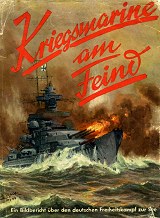 |
Home Intro Technical History Crew Models Gallery Kriegsmarine Archives
More Forum  UPDATES UPDATES |
Report of the Commander in Chief, Navy, to the Führer in the afternoon of 29 March 1940.
| Present: |
Generaloberst Keitel Generalmajor Jodl Fregattenkapitän von Puttkamer |
1. Aerial Mines: The Commander in Chief, Navy, asks for a decision on the question raised by him at the last conference regarding resumption of aerial mine warfare. Operations with aerial mines against Scapa Flow, agreed upon with the Commander in Chief, Luftwaffe, were planned for 28 March; however on the evening of 27 March they were cancelled by the Commander in Chief, Luftwaffe, without any reason being given, and any further operation was prohibited. Mine laying in Scapa Flow is essential for operation "Weserübung"; it is necessary to lay mines in the Thames, Humber, etc., in order to carry out the blockade. The Commander in Chief, Navy, proposes that the Commander in Chief, Luftwaffe, carry out the operation in Scapa Flow as soon as possible. The Commander in Chief, Navy, will continue mine warfare in the areas of the Thames, the Humber, the Downs, and French harbors. Speed is necessary in view of the waning moon. As soon as the Commander in Chief, Luftwaffe, has sufficient squadrons available, mine warfare will be taken over by him, but with closest cooperation between Group West and the 9th Air Division, as recently discussed. The Führer and the Chief of the OKW fully agree and will take the matter up with the Commander in Chief, Luftwaffe.
2. Operation "Weserübung": According to a report from the Naval Attaché, anti-aircraft units have been given permission to fire without consulting Oslo; it is probable (but not certain) that such a permission was likewise given to crews of coastal fortifications. It is to be expected that the attitude of the Norwegians is becoming more determined, therefore it is desirable to accelerate operation "Weserübung".
Regarding U21, there are as yet no reports from the commanding officer which would give a clear picture of the incident. At the present moment it is not to our political advantage to put Norway in an unfavorable position as regards Britain by exercising too great pressure, since Britain must not be given any pretext now for action against Norway.
3. Oil Supplies: Field Marshal Göring made the following statement during a conference in the presence of Ministerialrat Fetzer, who informed the Commander in Chief, Navy: "Army and non-military supplies will be at an end by May, and those of the Air Force by July. The Navy must help to ease the situation from its large supplies of Diesel oil." The Navy is ready to do so, but it will surrender oil only on special orders from the Führer, so that it cannot be accused later of not having built up sufficient stocks. The Commander in Chief, Navy, reports on the incorrect procedure followed by the Ministry of Economics. In peacetime they permitted themselves to become completely dependent on Shell and Standard and, under pressure from these, continually attempted to prevent the Navy from purchasing oil in Mexico. The result is that the Ministry of Economics has neglected to provide oil supplies for industry, and the Navy is now called upon to ease the situation with the supplies accumulated against the wishes of the Ministry, so that industry will not come to a standstill. (See Annex 1.)
Naval supplies:
16 March 1940: fuel oil 300,000 tons, gas oil 570,800 tons.
1 October 1940: fuel oil 290,000 tons, gas oil 517,500 tons.
4. Shipping Office: The Commander in Chief, Luftwaffe, will recommend establishing the Shipping Office in the Ministry of Transportation. This has been requested by the Commander in Chief, Navy, and is urgently necessary. Shipping interests have not been looked after sufficiently up to now by officials, most of whom were originally connected with the railroads. The importance of shipping is still not being recognized by the Ministry of Transportation.
5. Private Conference between the Führer and the Commander in Chief, Navy: The Führer once again declares that he considers it necessary to leave naval forces behind in Narvik and Trondheim in order to reinforce and support the troops which will have landed (e.g., in setting up the guns).
The Commander in Chief, Navy, enumerates the reasons against this, which have already been set forth repeatedly: In Narvik destroyers are helpless, since they are exposed to the danger of being destroyed by superior forces. Troops on land can, on the other hand, take cover. Steamers for the transport of the guns are available there. Anchorages that are safe from submarines are also not available in Trondheim. Damaged vessels have orders to make for Trondheim and Bergen. The Führer gives up the idea of leaving ships behind in Narvik; as regards Trondheim, the Commander in Chief, Navy, will investigate the matter once more.
Annex 1
Until 1937 the oil companies of Shell (British concern) and Standard (American concern) supplied the Navy with oil in exchange for reichsmarks. With the introduction of oil sanctions against Italy these concerns stated that they could continue to deliver supplies to the Navy only in return for cash payments in foreign currency. Since dollars were not available in large amounts, connections had to be made with oil firms which were not bound to any large concern, which were completely independent in decisions concerning deliveries, and methods of payment. Oil firms of this type are now ruthlessly being combated all over the world by the large oil concerns of Shell and Standard.In order to prevent the Navy from dealing with such independent oil firms, the representatives of the Shell and Standard concerns informed the Ministry of Economics that they had orders from their foreign head offices to stop deliveries to Germany if the Navy continued to make contracts with smaller firms not under their control. These threats became particularly strong when the Navy stated that it was ready to buy up any quantities of oil which had become available in Mexico, owing to the seizure of the Shell and Standard concerns there, and which up to that time had been going mainly to Britain.
Under pressure from the Shell and Standard concerns, the Ministry of Economics made the greatest difficulties regarding the naval contracts. The argument was always used that it was necessary to meet the wishes of the large foreign oil concerns because they would otherwise stop supplying Germany with petroleum, with the consequence that a catastrophic shortage of gasoline would necessarily result.
These threats by the large oil concerns were a bluff, however, as the Navy pointed out repeatedly, because there are thousands of independent oil firms in the world outside these two concerns, many of which would have been prepared to undertake supplying Germany with fuel of all kinds under more favorable conditions. However, the Ministry of Economics did not alter its attitude towards the large concerns. It put more faith in statements of the representatives of the foreign oil concerns than in those of the Commander in Chief, Navy, who repeatedly pointed out that apart from the Shell and Standard concerns there were other oil firms in the world which were in a position to make deliveries, even if their capital were not pooled to the extent prevailing in these two concerns. He also pointed out that Germany's supplies of fuel would necessarily become alarmingly dependent on foreign countries if she planned to get all her supplies exclusively from these oil concerns. As regards the Shell concern alone, it must have been known that it was used by the British Government in the most skillful manner for controlling the fuel supplies of possibly hostile countries.
If the advice of the Navy had been followed promptly, stocks could have been built up also for other branches of the Wehrmacht and for industry. These stocks could have been just as large as those the Navy built up for itself in the course of time, in the face of the resistance of the German authorities. If advice had been heeded the Navy would not have to part with a large part of its stocks now.

| Home Guestbook Quiz Glossary Help us Weights & Measures Video Credits Links Contact |

